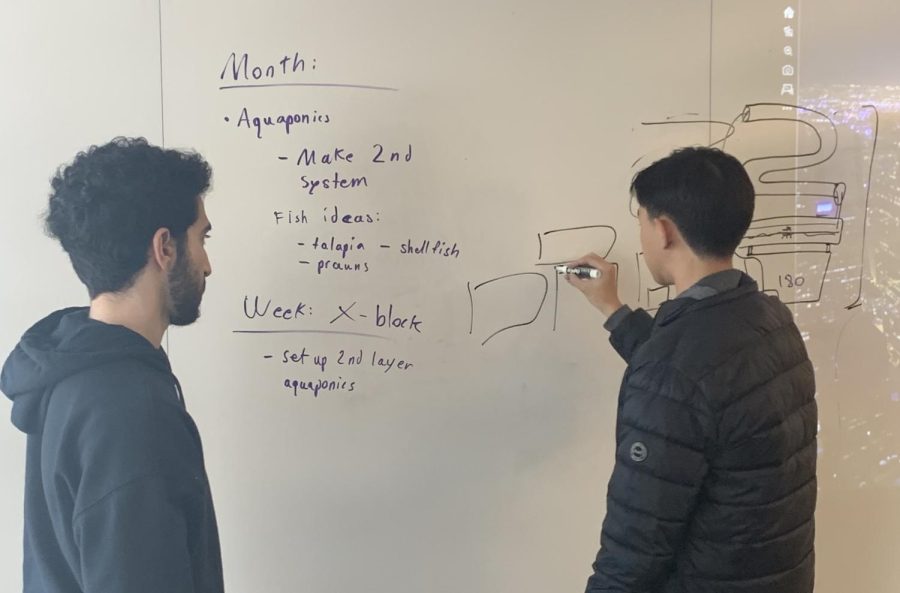Student Club Boosts Sustainable Agriculture
Sustainable Agriculture Club president Gabriel Tsai (right) and Arman Sajjadian (left) discuss an idea for a new hydraulic system.
February 2, 2023
The Sustainable Agriculture Club is a student-led group which focuses on the incorporation of environmentally-aware agricultural techniques into the everyday lives of Sage Hill students through education and the practice of sustainable farming methods. This club provides unique opportunities to participate in STEM-related activities at Sage while also having a community-centered message of sustainability that is relevant beyond the student body at Sage
Hill.
Senior Gabe Tsai explains that he founded the group as an extension of his Service Learning experience after noticing how the garden space was neglected, taking the opportunity to use his interest in environmental science and agriculture to contribute to the Sage community.
“I eventually realized that a lot of the garden fell into disuse because people weren’t taking care of it…I thought it would be a good opportunity to kickstart the garden again and teach the community more about sustainable agriculture methods,” Gabe said.
The club promotes a hands-on approach to science by encouraging students of all experience levels to take part in the group’s projects and help maintain the garden. In particular, senior Derek Chang explained that this group is a great way for those interested in the sciences to apply their knowledge from the classroom, saying, “There’s a really big environmental science passion at Sage that isn’t really tapped into. I think we provide a great opportunity for people who are interested in environmental sciences to take their interests and expand it to actual action and see what the future of green technology looks like.”
They hope to raise awareness about sustainability issues pertaining to food in our modern society, helping the Sage community make more conscious decisions to reduce our impact on the environment. Gabe mentioned that consumer awareness is an important topic which they hope to highlight to fellow students, as commercial goods are often more harmful to the environment than one may assume.
“It’s not just the resources that go into growing the crop that could be wasteful. It’s also the transportation methods, whether you’re shipping it, refrigeration…it’s a whole chain of unsustainable activity,” said Gabe.
The club combats these issues through the introduction of alternative farming techniques which save resources and are easily replicated at home. A central aspect of the group is their focus on education and community service by spreading awareness about environmentally-sustainable food sources. They emphasized that this project can empower students to see how each individual can make a difference in creating a more sustainable community.
“One of the main goals of our sustainable agriculture club is to show small-scale, local, community-level ways to grow food. Produce sustainability can be done really easily with simple materials…It doesn’t have to be anything complicated, you can do it yourself,” said Gabe.
Derek also mentioned his family’s implementation of solar panels similar to the ones in Sage’s garden, emphasizing how students can make environmentally-conscious changes using their knowledge from the Sustainable Agriculture Club.
Currently, the club oversees multiple sub-projects, including an aquaponics system, the chicken coop, a solar panel system, and their outdoor classroom space, among other more traditional farming areas. Senior Arman Sajjadian expanded on the details of the aquaponics system, explaining, “What’s nice about our system is it limits the amount of water that can escape from evaporation…it’s all going through tubing and the plants are collecting what they need; none of it runs off into the environment.”
Arman mentioned that this system also incorporates fish to produce nitrate-rich water which is used to grow plants as opposed to industrial farming tactics which are extremely wasteful.
“We also want to add a compost [system] so that we can use the chicken waste and some of the dead plant material to put that back into the garden,” said Arman.
However, they also hope that the garden project can gain greater attention throughout the student body, becoming a central part of the community which everyone is involved in. One main way to increase participation by the students is through the use of the “outdoor classroom,” which is a project that the Sustainable Agriculture Club has developed to benefit the community.
“Instead of being driven by Dr. Haney and the leadership that we have here, we wanted to turn this into a thing that people look at and are inspired to, you know, do more with the garden and add their own twist to it,” said Derek.
The Sustainable Agriculture Club welcomes any feedback or project ideas, and any students who are interested in getting involved are encouraged to participate! Meetings are usually held in the garden area on Tuesdays during X-Block, but students are all invited to help out in the garden at any time.


